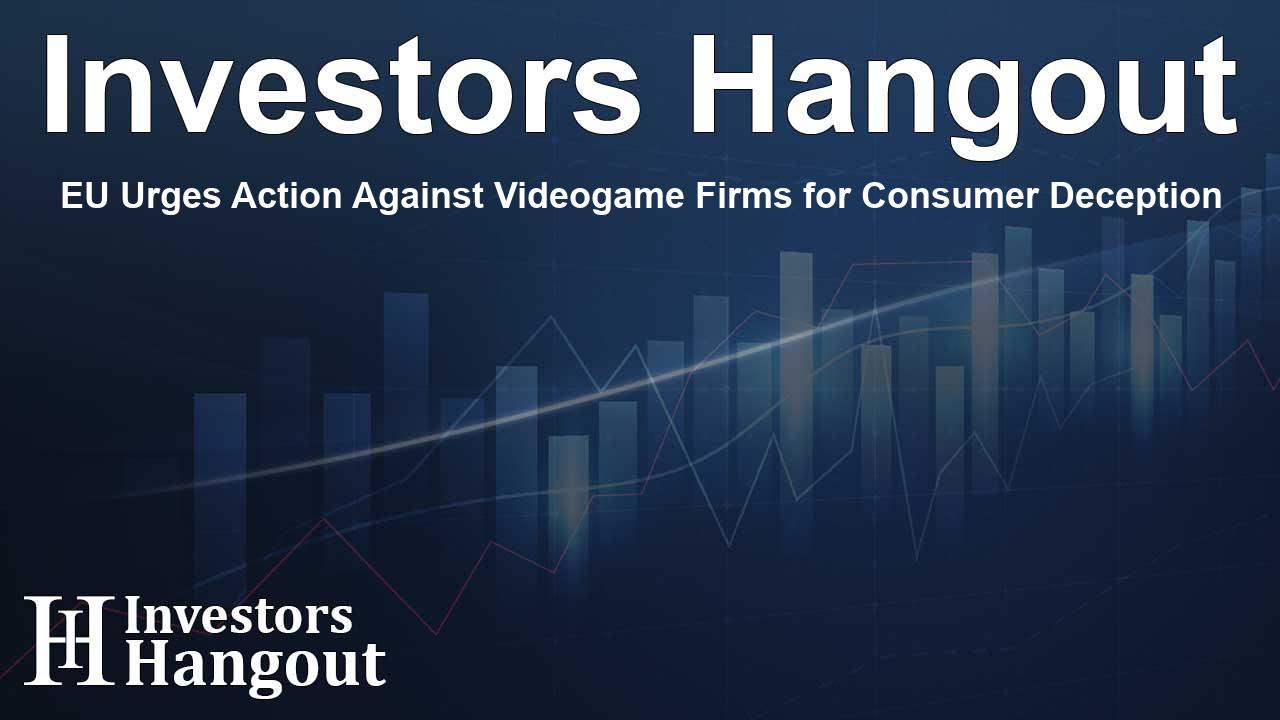EU Urges Action Against Videogame Firms for Consumer Deception

EU Takes a Stand Against Videogame Companies
In a critical move aimed at enhancing consumer protection, several well-known videogame firms have become the focus of a complaint filed by the European Consumer Organisation (BEUC). Leading companies, including Epic Games, Electronic Arts (NASDAQ: EA), and Roblox, along with others, are being accused of misleading consumers and encouraging impulsive spending in virtual environments.
Concerns Over Child Gaming Addiction
The rising concerns surrounding gaming addiction, especially among children, have led to heightened scrutiny of the gaming industry. Many parents express unease regarding elements of game design that seem tailored to foster addiction. This concern is underscored by BEUC's complaint, which highlights a disturbing trend where children are allegedly lured into excessive spending through cleverly designed in-game mechanics.
Background of the Complaint
On a recent Thursday, the BEUC, along with 22 national consumer groups from several European countries, lodged a formal complaint with the European Commission and the European Network of Consumer Authorities. BEUC's Director General, Agustin Reyna, passionately addressed the issue, stating that many players are misled into financial commitments that they do not fully comprehend. He emphasized that while the gaming realm is virtual, it must still adhere to the rules that govern real-world transactions.
The Tactics Used By Companies
One of the most pressing points raised in the complaint is the promotion and usage of premium in-game currencies. These currencies, according to Reyna, are designed to manipulate consumers into believing they require them for the best gaming experience. This manipulation significantly impacts children, as they may not fully grasp the financial implications of their in-game purchases.
Broader Implications for the Industry
The complaint doesn’t just stop at the major players like Epic Games and Electronic Arts. It also targets tech giants such as Microsoft (NASDAQ: MSFT) alongside its subsidiary, Activision Blizzard (NASDAQ: ATVI), and other influential studios like Mojang, Supercell, and Ubisoft. The allegations revolve around the idea that these companies knowingly exploit the vulnerability of younger audiences.
Need for Regulatory Changes
According to the BEUC, one of their primary concerns is the lack of transparency surrounding the real costs associated with digital items within games. This lack of clarity can lead to unintentional overspending, particularly among younger gamers who might not fully understand the value of what they are purchasing. Furthermore, there are concerns that consumers are often stripped of their rights when engaging with these premium currencies.
Consumer Rights in the Digital Age
The ongoing situation underscores the necessity for regulatory bodies to enact progressive changes that ensure consumer rights are upheld in the digital marketplace. As the gaming industry continues to expand, it is vital that consumer protection laws evolve in tandem, offering safeguards to prevent exploitative practices targeting vulnerable demographics.
The Industry’s Response
Though the details surrounding the response from the companies involved in this complaint remain unclear, the gaming community is watching closely. As public scrutiny intensifies, it is anticipated that these companies may need to reevaluate their strategies in light of new consumer protection regulations. The call for accountability and transparency in gaming is becoming a central theme of discussions among consumers and advocacy groups alike.
Frequently Asked Questions
What companies are involved in the EU complaint?
The complaint names several companies, including Epic Games, Electronic Arts, Roblox, Microsoft (Activision Blizzard), Mojang, Supercell, and Ubisoft.
What are the main allegations against these companies?
The main allegations involve misleading practices that encourage consumers, especially children, to spend money impulsively and without understanding the true costs associated with in-game purchases.
What prompted the filing of this complaint?
Growing concerns over children's gaming addiction and the manipulation of in-game spending practices have prompted this complaint from the European Consumer Organisation.
How does this affect consumer rights?
The complaint highlights the need for better consumer protection laws that ensure transparency and fairness in digital transactions, particularly for vulnerable consumer groups.
What is the potential outcome of this complaint?
If the complaint leads to regulatory changes, we may see increased oversight on the gaming industry and enhanced protections for consumers, particularly children.
About The Author
Contact Dylan Bailey privately here. Or send an email with ATTN: Dylan Bailey as the subject to contact@investorshangout.com.
About Investors Hangout
Investors Hangout is a leading online stock forum for financial discussion and learning, offering a wide range of free tools and resources. It draws in traders of all levels, who exchange market knowledge, investigate trading tactics, and keep an eye on industry developments in real time. Featuring financial articles, stock message boards, quotes, charts, company profiles, and live news updates. Through cooperative learning and a wealth of informational resources, it helps users from novices creating their first portfolios to experts honing their techniques. Join Investors Hangout today: https://investorshangout.com/
The content of this article is based on factual, publicly available information and does not represent legal, financial, or investment advice. Investors Hangout does not offer financial advice, and the author is not a licensed financial advisor. Consult a qualified advisor before making any financial or investment decisions based on this article. This article should not be considered advice to purchase, sell, or hold any securities or other investments. If any of the material provided here is inaccurate, please contact us for corrections.
